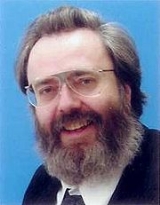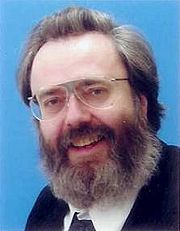
Karl Gottfried Brunotte
Encyclopedia

Germany
Germany , officially the Federal Republic of Germany , is a federal parliamentary republic in Europe. The country consists of 16 states while the capital and largest city is Berlin. Germany covers an area of 357,021 km2 and has a largely temperate seasonal climate...
composer
Composer
A composer is a person who creates music, either by musical notation or oral tradition, for interpretation and performance, or through direct manipulation of sonic material through electronic media...
and music philosopher, particularly noted for his contributions to church music
Church music
Church music may be defined as music written for performance in church, or any musical setting of ecclestiacal liturgy, or music set to words expressing propositions of a sacred nature, such as a hymn. This article covers music in the Judaeo-Christian tradition. For sacred music outside this...
.
Biography
Brunotte finished school in Bad HomburgBad Homburg
Bad Homburg vor der Höhe is the district town of the Hochtaunuskreis, Hesse, Germany, on the southern slope of the Taunus, bordering among others Frankfurt am Main and Oberursel...
(Kaiserin-Friedrich-Gymnasium). He studied music sociology
Sociology
Sociology is the study of society. It is a social science—a term with which it is sometimes synonymous—which uses various methods of empirical investigation and critical analysis to develop a body of knowledge about human social activity...
, music psychology
Psychology
Psychology is the study of the mind and behavior. Its immediate goal is to understand individuals and groups by both establishing general principles and researching specific cases. For many, the ultimate goal of psychology is to benefit society...
, ancient languages, aesthetics
Aesthetics
Aesthetics is a branch of philosophy dealing with the nature of beauty, art, and taste, and with the creation and appreciation of beauty. It is more scientifically defined as the study of sensory or sensori-emotional values, sometimes called judgments of sentiment and taste...
, piano
Piano
The piano is a musical instrument played by means of a keyboard. It is one of the most popular instruments in the world. Widely used in classical and jazz music for solo performances, ensemble use, chamber music and accompaniment, the piano is also very popular as an aid to composing and rehearsal...
, organ
Organ (music)
The organ , is a keyboard instrument of one or more divisions, each played with its own keyboard operated either with the hands or with the feet. The organ is a relatively old musical instrument in the Western musical tradition, dating from the time of Ctesibius of Alexandria who is credited with...
, harpsichord
Harpsichord
A harpsichord is a musical instrument played by means of a keyboard. It produces sound by plucking a string when a key is pressed.In the narrow sense, "harpsichord" designates only the large wing-shaped instruments in which the strings are perpendicular to the keyboard...
, violin
Violin
The violin is a string instrument, usually with four strings tuned in perfect fifths. It is the smallest, highest-pitched member of the violin family of string instruments, which includes the viola and cello....
, viola
Viola
The viola is a bowed string instrument. It is the middle voice of the violin family, between the violin and the cello.- Form :The viola is similar in material and construction to the violin. A full-size viola's body is between and longer than the body of a full-size violin , with an average...
, recorder
Recorder
The recorder is a woodwind musical instrument of the family known as fipple flutes or internal duct flutes—whistle-like instruments which include the tin whistle. The recorder is end-blown and the mouth of the instrument is constricted by a wooden plug, known as a block or fipple...
, singing, conducting
Conducting
Conducting is the art of directing a musical performance by way of visible gestures. The primary duties of the conductor are to unify performers, set the tempo, execute clear preparations and beats, and to listen critically and shape the sound of the ensemble...
, and musical composition
Musical composition
Musical composition can refer to an original piece of music, the structure of a musical piece, or the process of creating a new piece of music. People who practice composition are called composers.- Musical compositions :...
, as well as electronic music
Electronic music
Electronic music is music that employs electronic musical instruments and electronic music technology in its production. In general a distinction can be made between sound produced using electromechanical means and that produced using electronic technology. Examples of electromechanical sound...
, with (amongst others) Heinz Werner Zimmermann
Heinz Werner Zimmermann
Heinz Werner Zimmermann is a German composer.Zimmermann had his first composition instruction from 1946 to 1948 with Julius Weismann and studied from 1950 to 1954 in Heidelberg with Wolfgang Fortner as well as at the Institut for Protestant Church Music there...
, Lothar Hoffmann-Erbrecht, Hans Peter Haller, Gottfried Michael Koenig
Gottfried Michael Koenig
Gottfried Michael Koenig is a contemporary German-Dutch composer.-Biography:Koenig studied church music in Braunschweig, composition, piano, analysis and acoustics in Detmold, music representation techniques in Cologne and computer technique in Bonn. He attended and later lectured at the...
, and Karlheinz Stockhausen
Karlheinz Stockhausen
Karlheinz Stockhausen was a German composer, widely acknowledged by critics as one of the most important but also controversial composers of the 20th and early 21st centuries. Another critic calls him "one of the great visionaries of 20th-century music"...
.
From 1974 to 1977 he held the position of Cantor at the Christuskirche in Bad Homburg, where he later was a lecturer at the Hochschule für Musik und darstellende Kunst (1982–1985) (Anon. 2007). From 1980 to 1986 he was Senior Lecturer at the International Vacation Courses for New Music in Darmstadt
Darmstadt
Darmstadt is a city in the Bundesland of Hesse in Germany, located in the southern part of the Rhine Main Area.The sandy soils in the Darmstadt area, ill-suited for agriculture in times before industrial fertilisation, prevented any larger settlement from developing, until the city became the seat...
, and a member of the Darmstadt Institute for Music and Musical Education. In the 1984–85 year he was Rapporteur für Ernste Musik at the Landsmusikrat Hessen (Nordin [2004]). Once a Jesuit novice, in 1987 he joined The Church of Jesus Christ of Latter-day Saints (Anon. 2007).
Since 1993 he has worked at the University of Frankfurt in the Institut für Musikwissenschaft und Musikpädagogik, as well as at the Fachhochschule Frankfurt für elektronische Musik (Anon. 2007).
He has composed nearly 300 pieces for the most diverse forces.
Select list of compositions
- Apokrypta, for organ (1999)
- Dimensiones orbitalis IV, for harp (2006)
- Dunkelziffer, for maximum-range voice, percussion, and electronic sounds (1997)
- Erdenlicht, in memoriam Marc Chagall, for flute, bassoon, and piano (with assistant)
- Hypotosis … selene …, for a clarinetist, a pianist/percussionist, and electronic sounds (1997)
- In aeternum II, for organ
- Intemporale, for clarinet, piano, and metronome
- Lehis Traum
- Mater dolorosa, for violin and piano
- Nachruf für Werner Heissenberg, electronic and concrete music
- Tangenten, for piano (1975)
- Ultravox I & III
External links
- Composers own professional XING-profile: http://www.xing.com/profile/KarlGottfried_BrunOtte
- "Karl Gottfried Brunotte". Lothringer Verlag für Bühne und Musik (publisher’s website, accessed 18 February 2010)
- Nordin, Ingvar Loco. "review of Nachruf für Werner Heissenberg (CD)". Sonoloco website (accessed 18 February 2010)

